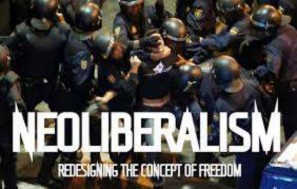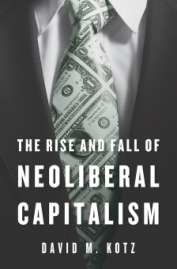What is neoliberalism?
Editor
 [su_spacer size=”10″]John Kelly is an independent commentator writing for the Australian Independent Media network. In a recent blog [1] he said that our model of democracy is failing us; also that we fail democracy when not actively engaging with it.
[su_spacer size=”10″]John Kelly is an independent commentator writing for the Australian Independent Media network. In a recent blog [1] he said that our model of democracy is failing us; also that we fail democracy when not actively engaging with it.

According to Kelly:
” Democracy, as we practice it today, has lost its essential direction and has been usurped by a divisive creed full of vitriolic, jingoistic spin. ”
He identifies this creed as neoliberalism, which he defines by reference to the writings of US academic economist Prof David Kotz, who said in 2002 [1]:
“ Neoliberal theory claims that a largely unregulated capitalist system (a “free market economy”) not only embodies the ideal of free individual choice but also achieves optimum economic performance with respect to efficiency, economic growth, technical progress, and distributional justice.
“The state is assigned a very limited economic role: defining property rights, enforcing contracts, and regulating the creation of money. State intervention to correct market failures is viewed with suspicion, on the ground that such intervention is likely to create more problems than it solves. ”
David Kotz then goes on to say:
“ The policy recommendations of neoliberalism are concerned mainly with dismantling what remains of the regulationist welfare state. These recommendations include deregulation of business; privatization of public activities and assets; elimination of, or cutbacks in, social welfare programs; and reduction of taxes on both businesses and the investing class.
“In the international sphere, neoliberalism calls for free movement of goods, services, capital, and money (but not people) across national boundaries. ”

It is also worth reading the most recent book by Kotz, The rise and fall of neoliberal capitalism [2]. The following is a brief summary of the concerns of the book [3]:
“In 2008 a severe financial and broad economic crisis broke out in the United States. It rapidly spread to much of the global financial and economic system .…
While the acute stage of financial collapse and economic free-fall at the start of the crisis has passed, it has been followed by a period of stagnation and economic instability….
“This crisis issued from the particular form of capitalism in the United States in recent decades, often called free- market, or neoliberal, capitalism.
Neoliberal capitalism arose around 1980, first in the United States and the United Kingdom, replacing the quite different “regulated capitalism” that had preceded it. It soon spread to many, although not all, other countries, and came to dominate the global-level economic institutions of this era.
“…In brief, in neoliberal capitalism market relations and market forces operate relatively freely and play the predominant role in the economy. By regulated capitalism we mean a form of capitalism in which such non-market institutions as states, corporate bureaucracies, and trade unions play a major role in regulating economic activity, restricting market relations and market forces to a lesser role in the economy.
“[T]he crisis that began in 2008 is not just a financial crisis, or a particularly severe recession—or a combination of the two. It is a structural crisis of the neoliberal form of capitalism.…[T]he crisis, unlike an ordinary business cycle recession, cannot be resolved within the current structural form.…Even a bold Keynesian policy of fiscal expans- ion through big increases in public spending, while capable of stimulating faster economic growth and creating more jobs for a time, would not in itself resolve the underlying structural problem that is blocking a resumption of a normal trajectory of profit-making and economic expansion over the long run. Rather, major structural change in the economy and other related aspects of society represents the only route to resolving the current crisis, a view that finds support from the history of the resolution of past structural crises in the U.S. such as that of the 1930s. ”

Kelly also makes the point that:
“This is the Magna Carta of the rich and powerful. It was they who, by puppeteering Ronald Reagan and Margaret Thatcher, and with a great deal of effort and money, penetrated not just the media and simple-minded politicians, but also economists and academics the world over, who expounded their mantras, including ‘trickle down economics’ wherever they could. ” [su_spacer size=”10″]

According to Kelly, the worldwide neoliberal movement has been so successful over the past 45 years that much of what it preaches has become the standard understanding of what constitutes a democratic system of government. Thus he says:
“In gradually unwinding the very principles of democracy and shaping our minds to believe that their way of seeing things is the true democratic way, they have been able, particularly since 1971, to acquire, accumulate and centralise massive wealth and thus assume control over practically every facet of our lives.
“Their greed has wrought devastating pain, poverty, hardship, war, disease and the deaths of millions of ordinary people around the globe, but if you dare challenge them, they would say, ‘Look over there. A terrorist’. It has been a relentless campaign conducted largely through a compliant media and by lobbying both corrupt politicians and those that simply don’t know any better; the latter being the vast majority. ”
Kelly also quotes Australia’s Prof Bill Mitchell [1]:.
“ The general population lives in smoke haze of half-truths, misperceptions and outright lies, all driven by some fear of loss that is whipped up daily in the media as part of the above campaign. ”
So who is to blame for this? In addition to the neoliberal advocates, the media and the spin doctors, Kelly thinks that much of the problem arises from the ignorance and naivete of the average citizen, who does not realise that the noble democratic ideal has been fully surrendered in favour of neoliberalism, a greedy winner-take-all ideology that is slowly destroying the world.
John Kelly holds a B. Communications degree, majoring in Journalism and Media Relations. He has authored four novels and an autobiography. As well as being a regular writer for The AIM Network, he operates a website, The View From My Garden, which covers various social, religious and political issues. http://johnbkelly.wordpress.com.
David M. Kotz is currently a Professor in the Department of Economics, University of Massachusetts, Amherst, USA, and is also Co-Director of the Department of Political Economy, Shanghai University of Finance and Economics, Shanghai, China.
References:
-
John Kelly, AIM Network, 11 Jan 2016 http://theaimn.com/what-is-neo-liberalism-and-why-knowing-matters/
-
David M. Kotz, The rise and fall of neo- liberal capitalism, Harvard Univ Press, Feb 2015. http://www.hup.harvard.edu/catalog.php?isbn=9780674725652



























